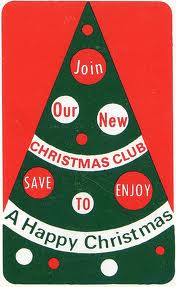Do you remember each and every Christmas gift you received as a child? In my family, I am  noted as the person with the most “long term memory,” but even I can only remember a handful of them. What I do remember most about Christmases’ past is the day spent with extended family, the pretty tree and decorations, and of course all the good food. So if you’re sitting at home this January feeling guilty because you didn’t give your kids the usual Santa bag full of gifts, take heart. They are not going to be scarred for life because they didn’t get a ton of presents last month.
noted as the person with the most “long term memory,” but even I can only remember a handful of them. What I do remember most about Christmases’ past is the day spent with extended family, the pretty tree and decorations, and of course all the good food. So if you’re sitting at home this January feeling guilty because you didn’t give your kids the usual Santa bag full of gifts, take heart. They are not going to be scarred for life because they didn’t get a ton of presents last month.
That being said, I acknowledge that gift giving is an important part of the holidays. Who can forget the excitement of bedtime on Christmas Eve, when you knew morning would bring a world of magic? From an adult perspective, the holidays aren’t quite so magical, and it’s not because you know who Santa really is. This is just my personal take on the holidays, but I really don’t mind the extra work of decorating and cooking. It’s finding the extra dollars to purchase gifts that is the biggest challenge. Christmas can be a difficult time of year, money-wise. It’s too late now to do anything about the Christmas that just passed, but you can make plans to handle next year’s financial holiday stress by considering an old-fashioned concept—opening a Christmas Club.
Christmas club accounts were very popular when I was a kid. My mom had one for the family and I had a small one for myself. It cost 50 cents a week, and every November I would get a check for $25 to spend on gifts for my parents and siblings ($25 bought a lot of stuff in the 60’s). I would divide up my paper route money and put $2 away every month. As credit cards became more prevalent in the 70’s and 80’s, people let go of the Christmas club method of savings. The current recession might be the perfect time to resurrect that tradition.
Christmas clubs were savings programs set up by banks during the Great Depression. If you wanted to participate, you would pick an amount of money you thought was needed for gifts, deposit a set amount every week, and receive the money back at the end of the year (just in time for Christmas shopping). The check would include the amount you deposited, plus some interest. With the current economic situation being what it is, the interest you earn will be minimal, but that is true of most savings accounts right now. The real financial advantage will come when you spend cash for your gifts instead of credit. That way you avoid the interest and charges you would usually be paying January through June of the following year. What good does it do to fight the crowds on Black Friday to get a $60 sweater for $30 if you end up paying $80 for it with all the interest charges?
 Some of you might be thinking “I can do this on my own without having to use a special account.” If you can, that’s great. But if you need a little more structure to keep you honest, a Christmas club is the perfect solution. Most of the banks that are located where I live in northern Ohio offer Christmas clubs. January is the perfect time to go to your bank and talk to a representative about starting an account. It is also a time for resolutions of all kinds (both health and wealth), so this would be one small step you could implement that would pay large dividends next December. Ask for an amount to be automatically withdrawn from your checking account and transferred into your Christmas club.
Some of you might be thinking “I can do this on my own without having to use a special account.” If you can, that’s great. But if you need a little more structure to keep you honest, a Christmas club is the perfect solution. Most of the banks that are located where I live in northern Ohio offer Christmas clubs. January is the perfect time to go to your bank and talk to a representative about starting an account. It is also a time for resolutions of all kinds (both health and wealth), so this would be one small step you could implement that would pay large dividends next December. Ask for an amount to be automatically withdrawn from your checking account and transferred into your Christmas club.
Some of the features you might want to inquire about include no minimum balance requirements, competitive interest rates, direct deposit, one free withdrawal, and no monthly maintenance fee. Decide beforehand how much you think you will need to budget for gift giving, so you have a target figure in mind when you decide how much you want transferred into your club account. It’s actually easier to have a Christmas club account today than it was when I was a kid and I had to physically walk or ride my bike up to the bank every week to deposit some of hard-earned paper boy money!
A lot of full service customer options have gone the way of the dodo bird, from the guy who filled your tank at the gas station and washed your car windows to the farm workers who went door-to-door in our neighborhood selling fresh leaf lettuce and vegetables. I’m glad our banking institutions still offer this amenity to their customers. Once again, the way our parents and grandparents managed their finances is looking more and more attractive to a new generation of spenders.
Written by:
Donna Green
Extension Educator, Family and Consumer Sciences
Ohio State University Extension

